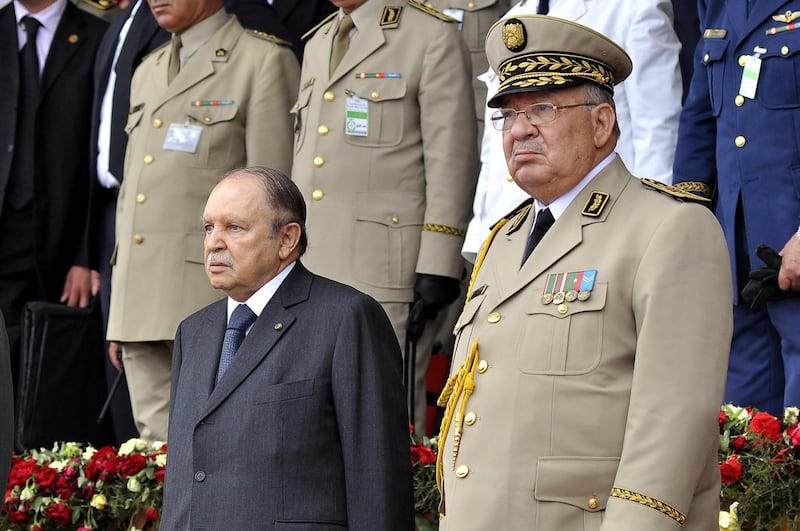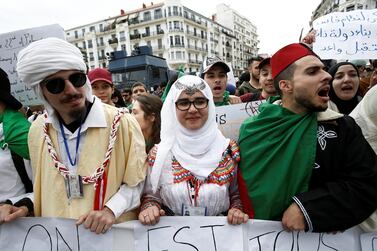As pressure builds against Algeria’s long-term ruler Abdelaziz Bouteflika, one of the country’s largest unions, as well as a member of the government’s coalition, backed the army’s call for new leadership.
Following a month of growing protests, the Democratic National Rally backed calls for the 82-year old Mr Bouteflika, who has been in power for two decades, to step down.
Army head Lt Gen Ahmed Salah said in a televised speech on Tuesday that Article 102 of the constitution allowed for the president to be declared unable to perform his duties because of serious illness.
"The Democratic National Rally recommends the resignation of President Abdelaziz Bouteflika according to the fourth paragraph of article 102 of the constitution," said the leader of the Democratic National Rally, Ahmed Ouyahia. "With the aim of smoothing the period of transition."
Mr Ouyahia is a long-time supporter of Mr Bouteflika and served as his prime minister three times since 2003 before being replaced on March 11 in a vain bid by the administration to calm the intensifying street protests.
But even the president's announcement on March 11 that he was withdrawing his candidacy failed to calm the widespread anger at the stagnant political arena. Although he said he wouldn’t stand, he delayed an election until after a monthslong national conversation about the country’s future and his successor is found.
Key regime figures have since broken ranks with Mr Bouteflika one by one in a bid to retain their hold on power.
Mr Bouteflika has been in power since 1999. He was weakened by a stroke in 2013 which affected his mobility and speech, and in rare recent public appearances he was in a wheelchair.
The General Union of Algerian Workers (UGTA), long a staunch supporter of the president, also said it supported the army call for Bouteflika to step down.
The announcements by three pillars of the establishment were a clear signal that the 82-year-old president - who has rarely appeared in public since suffering a stroke in 2013 - has little to no chance of staying in power in the North African country, an oil and gas producer.
The army has been patiently waiting for the right moment to intervene, after winning over Bouteflika's allies in a process that has emptied out his inner circle, in the hopes of a smooth transition period, political sources said.
But the leaders of five weeks of mass protests fuelled by anger over alleged corruption, nepotism and economic mismanagement said the plan still did not go far enough, risking a confrontation with the military.
"Protests will continue... Algerians' demands include a change of the political system," Mustapha Bouchachi, a lawyer and activist, told Reuters.
"The implementation of Article 102 means that the symbols of the system will oversee the transition period and organise presidential elections," he said.
"We want a real democracy not a facade of a democracy," said postal worker Zakaria Jaziri 26.
Any outright military rejection of demands for a democratic transition could deepen the biggest political crisis since 1992, when generals cancelled an election that Islamists were poised to win, triggering a civil war that killed 200,000 people.
"We welcome the army's initiative but we do not want Bouteflika's men to govern us until the next election," said 37-year old state bank employee Djamel Hadidi.







